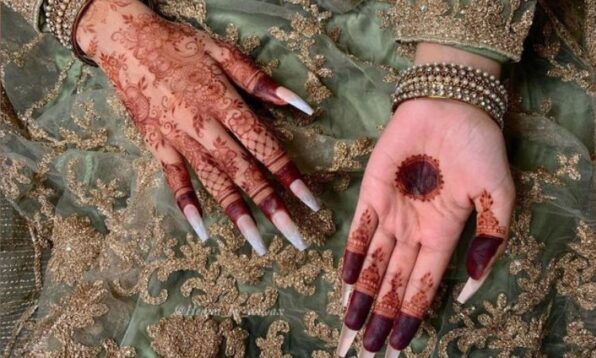Every bride wants to look her most radiant on her wedding day. And if you’ve been scrolling through endless bridal skincare routines, wondering what really works, you’ve probably come across chemical peels. And while it might sound scary, dermatologists assure that when done right and in time, chemical peeling is one of the safest and most effective ways to prep your skin before the big day. We spoke to dermatologist Dr Thalha, who shared his insights on why chemical peel treatments are a bridal skincare favourite and how to plan them perfectly in the run-up to your wedding.
Related: Laser Hair Reduction: Everything Brides-To-Be Should Know Before This Procedure
What do chemical peeling treatments do?

“Chemical peels are a great way to get that fresh, glowing bridal skin. They gently exfoliate and renew the skin, helping to smooth out texture, fade pigmentation, control acne, and reverse sun damage,” explains Dr Thalha. What makes them even better is how customisable they are. “Peels can be tailored for every skin type; your dermatologist will choose the right strength and peel to bring out your natural radiance safely before your big day,” says Dr Thalha. So whether you’re dealing with dullness, uneven tone, or post-acne marks, there’s likely a peel that can help.
Choosing the right type of peel
Not all peels are created equal, and that’s a good thing. “Different peels work best for different skin concerns; some are designed to tackle pigmentation and uneven texture, while others are ideal for acne-prone skin,” says Dr Thalha. The strength of the peel determines how deeply it works and how long your skin needs to recover. Your dermatologist will decide what’s best for you depending on your skin’s tolerance and how much downtime you can allow before your wedding.
Can peels help with acne scars and dullness?

One of the biggest skin complaints brides face is dullness — that tired, lacklustre look that no amount of highlighter can fix. Chemical peels work wonders here. “Chemical peels work by removing the excess build-up of the stratum corneum, the outermost layer of dead skin cells; to instantly reveal smoother, more radiant skin,” Dr Thalha explains.
They also lighten superficial pigmentation by redistributing melanin, helping you achieve that naturally luminous finish. However, Dr Thalha clarifies, “When it comes to deeper acne scars, their role is limited, and I prefer treatments like microneedling or laser resurfacing for them.”
Related: Best Acne Scar Treatments For Brides-To-Be: Dermatologist Recommends
When should you start your chemical peel treatments?
If you’ve got your wedding date locked in, it’s time to plan your skincare timeline. “Timing is everything,” says Dr Thalha. “Ideally, brides should begin their skin treatments about six to 12 months before the wedding. This gives enough time to address deeper concerns like acne or pigmentation and to space out sessions for chemical peels, microneedling, or laser procedures.” However, if you need just a quick session for minor issues, one to two months before the wedding should work.
Side effects of chemical peels: What’s normal and what’s not

Even though the word “chemical” might sound harsh, modern peels are quite gentle when done professionally. “With superficial and medium-depth chemical peels, temporary side effects like mild redness, slight burning, and gentle peeling are common; these usually settle within a few days to one or two weeks,” Dr Thalha explains. As the skin renews, some dryness or flaking can follow, but it’s all part of the process. The key is to go to a trained dermatologist who knows how to tailor it to your skin safely.
How many sessions do you really need?
While one session can give your skin a visible pick-me-up, it’s consistency that manages the deeper problems. “Most skin concerns require a series of peels rather than a single session for the best results. For superficial peels, brides usually need four to six sessions, spaced about two to four weeks apart,” shares Dr Thalha. This gradual approach helps your skin renew itself gently and glow from within.
What about skin purging before the wedding?
The last thing any bride wants is a breakout days before her wedding, but don’t panic if you see a few pimples pop up early in your treatment plan. “After starting stronger peels or exfoliating treatments, some may notice small pimples appearing within two to six weeks. This is known as purging,” Dr Thalha says. “It’s usually temporary, occurs only in acne-prone areas, and resolves on its own.”
To manage purging, Dr Thalha suggests sticking to gentle products and sunscreen and never picking your skin. Brides should avoid starting strong peels within six to eight weeks of the wedding to prevent any visible flare-ups.
Pre- and post-peel skincare rules
You can’t just walk into a chemical peel session and expect your skin to handle it perfectly without prep. “Before a chemical peel, stop using exfoliants, physical scrubs, and potent actives for three to seven days,” advises Dr Thalha.
After the peel, your routine should be simple and soothing. “Focus on gentle, fragrance-free moisturisers, and physical or mineral sunscreens to protect and support your skin’s healing.” Only once your skin has completely healed should you reintroduce active ingredients and always under your dermatologist’s supervision.
If there’s one step you can’t afford to skip post-peel, it’s sunscreen. “Sun protection is absolutely critical after a chemical peel,” says Dr Thalha. “The newly treated skin is highly sensitive to UV damage, and inadequate protection can lead to post-inflammatory hyperpigmentation, delayed healing, and less-than-ideal results.”
Gentle alternatives for brides with sensitive skin

Not every bride’s skin can tolerate peels, and that’s completely fine. “For brides who prefer gentle, minimal-downtime options, several treatments can help achieve glowing, even-toned skin without the risks of stronger peels. These include microdermabrasion, epidermal microneedling, lasers for pigmentation, and superficial LED therapy,” the dermatologist explains.
Chemical peeling treatments, when planned well and performed under expert care, can be a total game-changer for bridal skincare. So, if you’re a bride-to-be dreaming of luminous, even-toned skin, now’s the perfect time to start planning your treatments.
To connect with dermatologist Dr Mohammed Thalha for more personalised skin and hair care advice, find him here.
Images Source
Featured Image Source

 Web Stories
Web Stories













